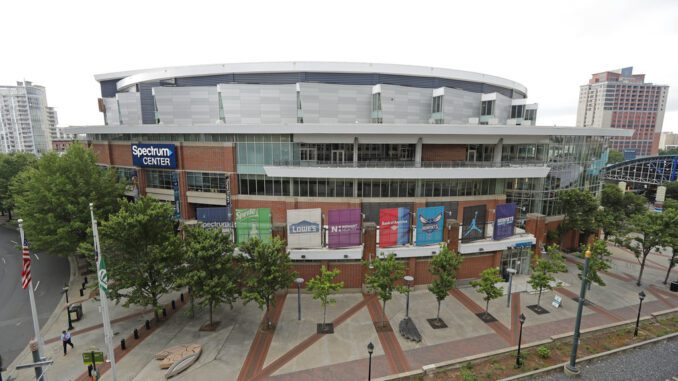
Taxpayers of Charlotte and North Carolina ― don’t fall for any new taxpayer-funded professional sports stadiums.
With the recent sale of the NBA’s Charlotte Hornets plus the ownership change for the NFL’s Carolina Panthers in 2018, there is going to be a lot of talk about building a new stadium for each franchise in the coming days.
The Hornets were reportedly sold for a valuation of $3 billion ― despite the fact they have been mediocre at best over their history. The Hornets were 423-600 during 13 years under the ownership of Michael Jordan with a mere two playoff appearances and no playoff series wins. The Hornets have won only four first-round playoff series since their inaugural season in 1988.
Panthers owner David Tepper bought the Panthers and Bank of America Stadium for $2.4 billion in 2018. That is beginning to look like the steal of the 21st century so far ― Dan Snyder just sold the Washington Commanders, née “Redskins,” plus the stadium in Landover, Maryland, for $6 billion. They have been far more mediocre (154-214-2) than the Panthers (174-195-1) for the past 22 seasons.
If new owners can buy a professional sports team for $3 billion, they can afford to pay for the construction of a new stadium to showcase their team. Oddly enough, despite vastly different seating capacities, construction costs for both new professional football and basketball teams stadiums have ranged between $1.4 billion to $2 billion based on recently completed projects.
If new owners buy a professional sports team and want to build a new stadium on their own dime, they can do whatever they choose to do. They can put on reenactments of chariot races from ancient hippodromes in Rome or continue to produce more mediocre NFL or NBA seasons as far as anyone else should be concerned. It would be “their” team and “their” stadium ― they should be able to run it freely as any other privately owned business is allowed to do without strings attached.
It is purely a business transaction for an investor group. Any discussion should be separated from sometimes irrational emotional local team attachments which have been used to force tax concessions from cities to keep their beloved “Bills” in Buffalo (which succeeded) or “Raiders” in Oakland (which did not).
However, when the new owners of the Panthers and the Hornets start grousing about the inadequacies of current facilities ― and you know they will very soon ― and start to try to force the city of Charlotte and state of North Carolina to help them build both new stadiums, both sets of owners have the golden opportunity to adopt a revolutionary new way to look at “public/private partnerships.” They could do something as revolutionary as when the Panthers sold “PSLs” (personal seat licenses) to pay off the debt used to construct the new stadium under the ownership of founder Jerry Richardson.
In return for any taxpayer-financed plan to build a new arena, a certain percentage of seats should be made available for free to any fan who wants to use them issued on a per game lottery basis. In a 75,000-seat arena, set aside 20% or 15,000 tickets per game. A middle-income family of four can hardly pay the $500-$1,000 it costs to go to a regular season game nowadays under any circumstance ― but technically, as a partial “owner” who helped finance the stadium through their taxes and guarantees, they can go and enjoy a game just like the main owners.
On top of set-aside seats for local taxpayers who are fans, city government should insist on receiving a small percentage of any upside increase in the value of the franchise when sold in return for guaranteeing any bonds used in the construction of the new facility. A mere 10% of any capital gain of $3 billion on the future sale of the Panthers or the Hornets would yield $300 million to local governments to build new schools, roads or low-income housing ― without raising property taxes or enacting local user fees and excise taxes.
Taxpayers should not bear the burden of helping build a new stadium for any professional sports team ― thereby “socializing” the downside risk for the owners ― without participating in some of the tangible upside benefits of capitalism those same owners will enjoy down the road.
Being a rabid Panthers or Hornets fan isn’t enough in this day and age.
Call this the “Taxpayer Benefit License” (TBL) if you will. Taxpayers are not serfs who exist to help wealthy professional team owners get wealthier. Make it truly a team effort in which everyone can take pride.

